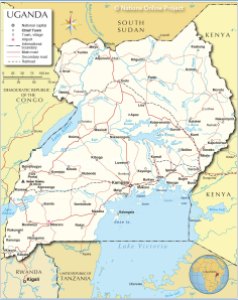For general information about the country profiles click here.
 Population: 36,345,860
Population: 36,345,860
HDI ranking: 161/187
HDI score: 0.456
Uganda’s decentralization process has included significant shifts from appointed local councils to popularly elected leadership boards. There is evidence that the country’s five-tier better enables the country’s government to include local citizens in decision-making processes.
Local governance at a glance
- At the national level the Ministry of Local Government is responsible for supervising decentralization and the local governance of states
- The local government is comprised of five different tiers of authority:
- 111 district councils
- 164 county and municipal councils
- 958 sub-county and town councils
- 5,238 parish councils
- 57,364 village (rural) and ward (urban) councils
- Upper level elections are conducted under a first-past-the-post system and candidates run on a party ticket.
- Lower level councils are directly elected through a secret ballot (CLGF, 2011).
Civil society actors include
- The Uganda National NGO Forum connects various organizations concerned with policy advocacy, capacity building, policy research and NGO mobilization in Uganda in one network.
Capacity building institutions
- The Uganda Local Governments Association (ULGA) hosts trainings for local government leaders to address their responsibilities as local councilors, how to conduct business pertaining to the local council, and planning and development.
- Widespread use of the radio has strengthened transparency in decision-making and enabled citizens to participate in discussions surrounding local government and civil society issues via radio programs (JAALGS, 2012).
Fiscal control
- The primary source of revenue for local government is in the form of grants from the central government. The allocation process is formula based, taking into consideration factors such as population, revenue per capita and area. In 2005, the share of local government in GDP was 7%. In 2008/2009, 12.3% of the total government expenditures were allocated toward the local government (CLGF, 2011).
- Local government also raises money through a graduated tax (suspended in FY 2004-2005), market dues, licenses and fees, and in the case of municipalities, property tax and ground rent (World Bank, 2012).
Key Initiatives for participatory local governance
- The Local Government Act 1997, lays out the structure for local governance; the decentralization policy is embedded in the Local Government Act (IFPRI, 2011).
- Within the past 10 years, the number of district councils has nearly doubled, increasing the participation on a local level.
- The Uganda Local Government Association (ULGA) and The Urban Authorities Association of Uganda (UAAU) promote local participatory governance.
- In 2010, the UAAU, the Municipal Development Partnership and the International City/County Management Association partnered together to assist the government in urbanization and in turn empower the local governments to reinforce active community participation (ICMA, 2013).
- In 2006, Uganda implemented a local government program that incorporated a friendly competition amongst districts to incentivize communities to promote participation within local governments. With funds from the World Bank, Uganda’s Ministry of Local Government created an incentives system that has successfully improved the functioning of local governments across the country (World Bank, 2013).
- Participatory budgeting efforts have been underway, and several committees – such as the Local Government Budget Committee and the Local Government Releases and Operations Committee – were established to assist with the decentralization of fiscal processes.
Challenges for participatory local governance
- Uganda has faced challenges in balancing the acknowledgement of traditional leadership while bringing about decentralized government. Another challenge cited by this article is that only Sub-county and District level councils have political authority and the resources needed to provide public services (JAALGS, 2012).
- Local governments are overdependent on grants from the central government since local governments have limited financial resources (IFPRI, 2011).
- The IFPRI report addresses the problem of having too few qualified people to effectively deliver services to the people and carry out successful development projects. However, the central government is working on making trainings available to local governments to increase their capacity (IFPRI, 2011).
Recent posts on this website about this country:
- LogoLink: Learning Initiative on Citizen Participation and Local Governance (2013)
- Strengthening local councils in Uganda (2013)
- Rural water development in sub-Saharan Africa : a comparative study between Uganda and Tanzania (2012)
- Conflict in Uganda’s land tenure system (2012)
- Agricultural commodities that respect land rights and food security : how to include land governance issues in sustainable commodity standards? (2012)
- Resettlement and gender dimensions of land rights in post-conflict northern Uganda (2012)
- Increasing tenure security in northern Uganda : how to use external support for strengthening bottom up approaches (2012)
- Foreign land acquisitions in Africa : an analysis of the impacts of individual land deals on local communities (2012)
- Who owns the land? : perspectives from rural Ugandans and implications for land acquisitions (2012)
- Uganda land alliance (2012)
List of Sources (in order of citation):
UN Human Development Index, 2012: “Uganda”
CLGF, 2011, “Uganda”
Journal of African & Asian Local Government Studies (JAALGS), 2012: “Decentralization and good governance in Africa: Institutional challenges to Uganda’s local governments”
World Bank, 2009 : “Local Government Discretion and Accountability: Application of a Local Governance Framework”
International Food Policy Research Institute (IFPRI), 2011: “Decentralization and rural service delivery in Uganda”
International City/Country Management Association (ICMA), 2010: “Strengthening Urban Local Governments in Uganda”
